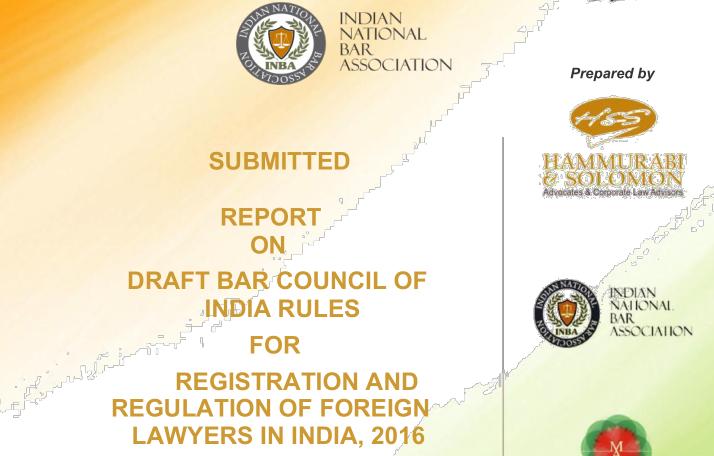
The Indian National Bar Association (INBA) has weighed into the legal market liberalisation debate, coming up with a proposal that would see foreign law firms entering by the end of this year, with “complete liberalisation” proposed to happen by the end of 2019.
The report, prepared by law firm Hammurabi & Solomon, the INBA and law and business consultancy Medhaadvisors, suggests that the draft Bar Council of India (BCI) rules, with several amendments, should be implemented by the fourth quarter of 2016, allowing foreign lawyers to practice non-Indian law and international arbitration in India.
This should be followed by a second phase, that would reform the Advocates Act 1961 and the Limited Liability Partnership Act 2008 to remove restrictions on lawyers’ advertising, partnerships and to reform legal education.
The final phase, which INBA proposes should be completed by the fourth quarter of 2019, would see “policy changes” required for foreign firms to form joint ventures and collaborate with Indian lawyers.
INBA secretary general Kaviraj Singh commented: "Yes, INBA propose to open the market immediately.”
When asked why, he added: “INBA has invited the comments from a large number of stakeholders i.e. lawyers, law firms, industry, inhouse counsel, students etc.
“They favour the opening of Indian legal market. It is a collective opinion of various stakeholders and in the best interest of India.
“It is not based on the particular group of personal interest. INBA did have the opinion from SILF members as well and this report is prepared by SILF office bearer, Manoj [Kumar, the founder of Hammurabi & Solomon].”
Advocates Act: to amend or not to amend?
When asked whether passing the current draft BCI rules were within the current powers of the government and/or the BCI without any legislative amendment, Singh said: “It is a tricky question. It is advisable to amend the Advocates Act to make it successful.”
In a panel debate last month, commerce ministry joint secretary Sudhanshu Pandey said that the government felt that no amendment of the Advocates Act was required.
By contrast, the Society of Indian Law Firms (Silf) in its 52-page proposal released last month, argued that the draft BCI rules were potentially not currently within the statutory powers of the BCI or government.
The Silf approach
The INBA approach is in marked contrast to that of fellow lawyers association and lobby group Society of Indian Law Firms (Silf), which has suggested a far longer phased timeline.
Silf’s first phase would only be complete once a “level playing field” is created qua foreign law firms, mainly by amending rules to allow domestic lawyers to market themselves and advertise, settle income tax implications of conversion to LLP, recognition of law firms by the BCI, ceasing of “surrogate practice” in India by foreign law firms, foreign law firms “ceasing of practice of Indian law outside of India”, “ability of Indian law firms to engage foreign lawyers” and any other items that emerge in consultation with the profession and the BCI”.
Silf suggested that once the “level playing field” is established, this should be followed by stage 2 where “foreign legal consultants” from abroad could advise on foreign law “under controlled conditions” including restrictions on the hiring of local lawyers.
During the first or second phase Silf also envisages various “legal education reforms”.
Silf’s third phase suggests foreign lawyers being allowed to practice Indian law “in certain areas” and begin joint ventures with local lawyers “under controlled conditions”.
Silf had in late 2014 argued for a five to seven year timeline for the entry of foreign law firms.
One big problem with Silf’s suggestion is that phase 1 is dependent on several external factors outside of the government’s and Silf’s control, and considering that the BCI has for decades shown little interest in law firms, regulation, or LLP conversions, for instance, major questions marks surround whether Silf’s full wishlist will ever complete, and how long it could hold up the process that the government seems to hope will happen sooner rather than later.
The INBA proposal
WAY FORWARD: RECOMMENDATIONS OF ENTRY IN PHASED MANNER:
While advocating liberalization, specific measures have to be taken to bring Foreign Law firms into IndianMarket, the opening up can be done in phases as proposed below so as to allow Indian firms to cope withthe change.
1. The first phase would be to allow foreign lawyers to practice in the areas covered in the Draft BCIRules.
2. The second phase would be bringing about internal reforms in various applicable laws such asthe Advocates Act,1961 and Limited Liability Partnership Act, 2008 which would in turn allowmore partners to be part of the firm, removing restrictions on advertising and initiating reforms inthe education sector is necessary to ensure availability of a good talent pool in legal profession.
3. Last Phase can be policy changes as necessary for expansion of the practice of foreign firms byallowing foreign lawyers to practice law in India including by forming joint ventures (JVs) and inCollaboration with Indian Lawyers. To come up with rules and policies to regulate the foreignlawyers and keep a check on their activity and to set up a disciplinary body to keep a tab onforeign lawyers as well.
In future, foreign firms should be allowed to set up own shops or acquire 100% of Indianlaw firms in accordance with applicable laws and FDI policy.
threads most popular
thread most upvoted
comment newest
first oldest
first
let us raise our voice and support whatever is good for country. not only for a few family law firms.
Meeting postponed to tomorrow...
threads most popular
thread most upvoted
comment newest
first oldest
first